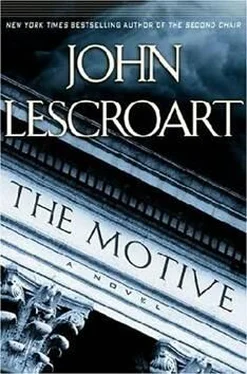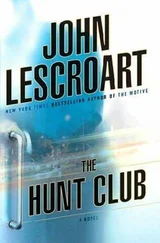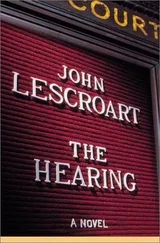Joseph Willis was the last eyewitness, and presented the most significant challenge, which was of course at the same time a golden opportunity.
Erudite, soft-spoken, nattily dressed in a soft camel-hair sport coat, light blue dress shirt and red bow tie, Maxine's husband didn't have any uncertainty whatsoever surrounding his identification of Catherine. Rosen had walked him through his testimony, which was unambiguous and delivered with great confidence. Unlike his wife, on the night of the fire he had never told arson inspector Bosio that it had been Missy leaving the house. He'd only ventured that it had been a woman. He hadn't been home for Inspector Cuneo's first visit when he'd brought around the newspaper photo of Missy, either, and so he hadn't tentatively identified her first. He, too, had picked Catherine first from Cuneo's photo, next from her booking mug shot, and finally from the July lineup.
Hardy, rising to cross-examine, knew that he had his work cut out.
"Mr. Willis, I'd like to go over your testimony about the woman you saw leaving the Hanover home on the night of the fire, and whom you've identified as Catherine Hanover."
"Certainly." Like his wife, Joseph knew he was key to the prosecution's case, and he, too-and with more justification-seemed to revel in the role. "I thought you might."
This brought a titter to the gallery, and Hardy let himself appear to smile. He was a swell guy able to take a little good-natured ribbing.
"Splendid," he said. "Then we're in accord." He paused for an instant. "Would you mind telling me about what time you saw the woman leave the Hanover home on that night?"
"I don't know exactly. I didn't check my watch."
"Could you hazard a guess?"
"Well, our friends had come by and we'd made cocktails. The show we hoped to attend started at nine and we wanted to get there by eight thirty, which meant we'd have to leave by eight. So I'd say we were in the living room between seven fifteen and seven forty-five."
"And what kind of evening was it?"
"As I recall, it was cool with a breeze, and then got foggy later." He looked over to the jury, and added,
"As usual in May and June." Meaning to be casual and friendly but coming across to the jury, Hardy hoped, as pedantic and even condescending.
"All right. Cool with a breeze. And you've testified that you noticed the woman's dark blue shirt because it was shiny, some kind of silklike material, is that right?"
"Yes?" Joseph Willis shifted in the witness box, crossed one leg over the other. From his expression, he didn't understand where this line of questioning was headed.
"Was that a question, Mr. Willis? Or an answer."
"I'm sorry. Yes. The shirt was shiny."
"And so are we to assume that the sun was out?"
"Your Honor!" Rosen spoke from his table. "Calls for speculation."
Braun looked down over her podium. "Mr. Hardy?"
"Let me rephrase." He came back to the witness. "I'd ask you to close your eyes if it would help you to remember, sir. When you first saw the woman leaving the Hanover home, was the sun shining?"
Much to Hardy's surprise, Willis actually complied. When he opened his eyes again after a couple of seconds, he nodded. "I believe it was, yes."
"Good. Now when did you first notice the woman?"
"Coming down the steps at Hanover's."
"Three houses up the street from your own?"
"That's right."
"About a hundred feet, would you say?" "About that."
"And at that time, the very first look you got, you told Mr. Rosen that you thought the woman was Missy D'Amiens?" "I did."
"And why was that?"
"Well, primarily I think because it was her house. She lived there. I'd seen her in similar clothing. I would have expected it to be her."
"All right. And where were you standing in your own home?"
"By the front window."
"A jutting bay window, is that right?"
"Yes."
"All right. Now, after this woman came down the steps, you said she crossed the street, is that right?"
"Yes."
"On a diagonal, or directly across?"
"I wasn't really watching that closely. I couldn't say."
"You weren't watching her?"
"No, not specifically. I was having cocktails with friends, as I said…"
"That's right. How many cocktails had you had by this time, by the way?"
For the first time, Willis's affable manner slipped. Clearly affronted, he flashed an angry look at Hardy. "One," he answered with no expression.
"In other words, you were on your first cocktail? Or you'd already had one and were on your second?"
"Your Honor." Rosen trying to come to the rescue. "Argumentative."
"Not at all, Mr. Rosen," Braun said. "Overruled. Mr. Willis, you may answer the question. Janet."
Jan Saunders read it back and Willis straightened his shoulders. "I don't recall exactly. I believe it was my first one."
"All right," Hardy said. "And for the record, what kind of cocktail was it?"
"Your Honor!" This time Rosen stood up with the scraping of his chair.
But before he could even state his grounds, Braun overruled him.
"It was a Manhattan," Willis said.
Hardy gave him a cold grin. The men were enemies now, punctiliously courteous in direct proportion to their growing hatred for one another. "That's two shots of good bourbon and a shot of sweet vermouth, is that right?"
"That's right."
"All right, now let's go back to the woman, who is now across the street, correct?"
"Yes."
"The woman you initially thought was Missy D'Amiens?"
"I thought she must have been Missy D'Amiens. I didn't think she was."
"Ah." Hardy brought in the jury with a look, then went back to the witness. "What made you change your mind?"
"She walked differently."
"She walked differently? How do you mean?"
"I mean, she had a different walk. I think it's rather clear. She didn't walk the same."
"So you'd studied Ms. D'Amiens's walk?"
This brought another rolling round of laughter to the gallery, and Willis glared out at it with nearly the same intensity as Braun.
"I noticed it. As one notices things. I didn't study it."
"All right, then. So this evening you simply noticed Ms. D'Amiens's walk?"
"Yes."
Hardy heard a sound behind him, a dull thud. He guessed it was Rosen letting his hand fall in frustration to the table, but he didn't dare slow down enough to turn and look. He didn't know ifWillis realized what he'd just said, but he was certain some members of the jury had.
"All right," he said. "But let me ask you this. If you were looking at Ms. D'Amiens's walk, how did you see her face?"
"I just," he stammered. "I just saw it."
"As she came abreast of where you stood in your bay window?"
"Yes."
"Directly across the street?"
"Yes."
"So you only saw her in profile?" This stopped Willis for an instant. "Yes," he said with a resurging bravado. "Yes, I guess I must have, mustn't I?"
"I believe so," said Hardy. He wasn't going to push on Willis any harder now. He'd already wounded him badly and the jury would resent him for it. Instead, he took a beat, a breath, then asked quietly. "Mr. Willis, your bay window is on Steiner Street, facing due west, is that true?"
"Yes."
"So it faces the sun as it sets, right?"
"Yes."
"And the sun was out on the day of the fire, correct?"
"Yes."
"Low in the sky, since it must have been at least seven fifteen and possibly as late as seven forty-five when the woman came out of Hanover's house? Mr. Willis," Hardy continued, "to review for the jury, you saw a woman whom you initially took to be Missy D'Amiens leave the Hanover home at around seven thirty. You saw her again in profile only across the street from your bay window, looking directly into a setting sun, in the course of which you were in the middle of an alcoholic beverage made with two shots of spirits and one of fortified wine. Is all of this correct?"
Читать дальше












